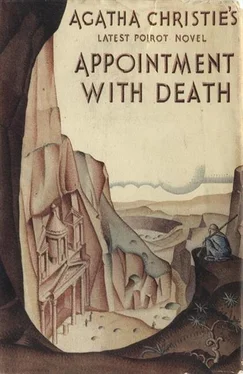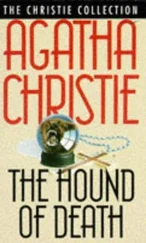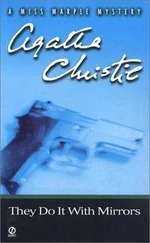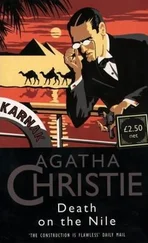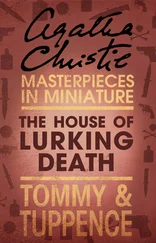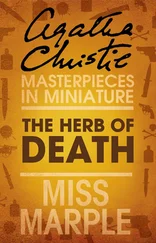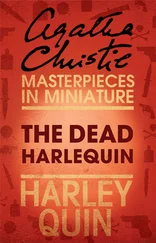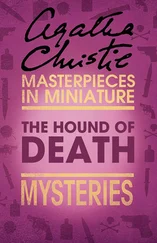Agatha Christie - Appointment with Death
Здесь есть возможность читать онлайн «Agatha Christie - Appointment with Death» весь текст электронной книги совершенно бесплатно (целиком полную версию без сокращений). В некоторых случаях можно слушать аудио, скачать через торрент в формате fb2 и присутствует краткое содержание. Год выпуска: 2007, ISBN: 2007, Издательство: Black Dog & Leventhal Publishers, Жанр: Классический детектив, на английском языке. Описание произведения, (предисловие) а так же отзывы посетителей доступны на портале библиотеки ЛибКат.
- Название:Appointment with Death
- Автор:
- Издательство:Black Dog & Leventhal Publishers
- Жанр:
- Год:2007
- ISBN:ISBN-10: 1579126928
- Рейтинг книги:4 / 5. Голосов: 1
-
Избранное:Добавить в избранное
- Отзывы:
-
Ваша оценка:
- 80
- 1
- 2
- 3
- 4
- 5
Appointment with Death: краткое содержание, описание и аннотация
Предлагаем к чтению аннотацию, описание, краткое содержание или предисловие (зависит от того, что написал сам автор книги «Appointment with Death»). Если вы не нашли необходимую информацию о книге — напишите в комментариях, мы постараемся отыскать её.
Appointment with Death — читать онлайн бесплатно полную книгу (весь текст) целиком
Ниже представлен текст книги, разбитый по страницам. Система сохранения места последней прочитанной страницы, позволяет с удобством читать онлайн бесплатно книгу «Appointment with Death», без необходимости каждый раз заново искать на чём Вы остановились. Поставьте закладку, и сможете в любой момент перейти на страницу, на которой закончили чтение.
Интервал:
Закладка:
He turned to Poirot. "I assure you, my friend, that is so!"
"Oh, I do not doubt it," said Poirot. "There was a little fact I had already noted-the fact that M. Boynton had replaced his mother's wristwatch. That was capable of two explanations-it might have been a cover for the actual deed, or it might have been observed and misinterpreted by young Mrs. Boynton. She returned only five minutes after her husband. She must therefore have seen that action. When she got up to her mother-in-law and found her dead, with the mark of a hypodermic syringe on her wrist, she would naturally jump to the conclusion that her husband had committed the deed-that her announcement of her decision to leave him had produced a reaction in him different from that for which she had hoped. Briefly. Nadine Boynton believed that she had inspired her husband to commit murder."
He looked at Nadine. "That is so, Madame?"
She bowed her head. Then she asked: "Did you really suspect me, M. Poirot?"
"I thought you were a possibility, Madame."
She leaned forward. "And now? What really happened, M. Poirot?"
17
"What really happened?" Poirot repeated.
He reached behind him, drew forward a chair and sat down. His manner was now friendly-informal. "It is a question, is it not? For the digitoxin was taken, the syringe was missing. There was the mark of a hypodermic on Mrs. Boynton's wrist."
"It is true that in a few days' time we shall know definitely-the autopsy will tell us-whether Mrs. Boynton died of an overdose of digitalis or not. But then it may be too late! It would be better to reach the truth tonight-while the murderer is here under our hand."
Nadine raised her head sharply. "You mean that you still believe that one of us here in this room-" Her voice died away.
Poirot was slowly nodding to himself. "The truth-that is what I promised Colonel Carbury. And so, having cleared our path we are back again where I was earlier in the day, writing down a list of printed facts and being faced straight away with two glaring inconsistencies."
Colonel Carbury spoke for the first time.
"Suppose, now, we hear what they are?" he suggested.
Poirot said with dignity: "I am about to tell you. We will take once more those first two facts on my list. Mrs. Boynton was taking a mixture of digitalis and Dr. Gerard missed a hypodermic syringe. Take those facts and set them against the undeniable fact with which I was immediately confronted: that the Boynton family showed unmistakably guilty reactions. It would seem therefore certain that one of the Boynton family must have committed the crime! And yet those two facts I mentioned were all against that theory. For, see you, to take a concentrated solution of digitalis-that, yes, it is a clever idea, because Mrs. Boynton was already taking the drug. But what would a member of her family do then? Ah, ma foi! There was only one sensible thing to do. Put the poison into her bottle of medicine! That is what anyone-anyone with a grain of sense and who had access to the medicine-would certainly do!"
"Sooner or later Mrs. Boynton takes a dose and dies-and even if the digitoxin is discovered in the bottle it may be set down as a mistake of the chemist who made it up. Certainly nothing can be proved!"
"Why, then, the theft of the hypodermic needle?"
"There can be only two explanations of that. Either Dr. Gerard overlooked the syringe and it was never stolen, or else the syringe was taken because the murderer had not got access to the medicine-that is to say, the murderer was not a member of the Boynton family. The two first facts point overwhelmingly to an outsider as having committed the crime!"
"I saw that but I was puzzled, as I say, by the strong evidences of guilt displayed by the Boynton family. Was it possible that, in spite of that consciousness of guilt, the Bovntons were innocent? I set out to prove, not the guilt, but the innocence of those people!"
"That is where we stand now. The murder was committed by an outsider-that is, by someone who was not sufficiently intimate with Mrs. Boynton to enter her tent or to handle her medicine bottle."
He paused.
"There are three people in this room who are, technically, outsiders, but who have a definite connection with the case."
"M. Cope whom we will consider first, has been closely associated with the Boynton family for some time. Can we discover motive and opportunity on his part? It seems not. Mrs. Boynton's death has affected him adversely-since it has brought about the frustration of certain hopes. Unless M. Cope's motive was an almost fanatical desire to benefit others, we can find no reason for his desiring Mrs. Boynton's death. Unless, of course, there is a motive about which we are entirely in the dark. We do not know exactly what M. Cope's dealings with the Boynton family have been."
Mr. Cope said, with dignity: "This seems to me a little far-fetched, M. Poirot. You must remember, I had absolutely no opportunity for committing this deed, and in any case. I hold very strong views as to the sanctity of human life."
"Your position certainly seems impeccable," said Poirot with gravity. "In a work of fiction you would be strongly suspected on that account."
He turned a little in his chair. "We now come to Miss King. Miss King had a certain amount of motive and she had the necessary medical knowledge and is a person of character and determination, but since she left the camp before three-thirty with the others and did not return to it until six o'clock, it seems difficult to see where she could have had an opportunity."
"Next we must consider Dr. Gerard. Now, here we must take into account the actual time that the murder was committed. According to M. Lennox Boynton's last statement, his mother was dead at four thirty-five. According to Lady Westholme and Miss Pierce she was alive at four-fifteen, when they started on their walk. That leaves exactly twenty minutes unaccounted for. Now, as these two ladies walked away from the camp Dr. Gerard passed them going to it. There is no one to say what Dr. Gerard's movements were when he reached the camp because the two ladies' backs were towards it. They were walking away from it. Therefore it is perfectly possible for Dr. Gerard to have committed the crime. Being a doctor, he could easily counterfeit the appearance of malaria. There is, I should say, a possible motive. Dr. Gerard might have wished to save a certain person whose reason (perhaps more vital a loss than a loss of life) was in danger and he may have considered the sacrifice of an old and worn out life worth it!"
"Your ideas," said Dr. Gerard, "are fantastic!" He smiled amiably.
Without taking any notice, Poirot went on. "But if so, why did Gerard call attention to the possibility of foul play? It is quite certain that, but for his statement to Colonel Carbury, Mrs. Boynton's death would have been put down to natural causes. It was Dr. Gerard who first pointed out the possibility of murder. That, my friends," said Poirot, "does not make common sense!"
"Doesn't seem to," said Colonel Carbury gruffly. He looked curiously at Poirot.
"There is one more possibility," said Poirot. "Mrs. Lennox Boynton just now negated strongly the possibility of her young sister-in-law being guilty. The force of her objection lay in the fact that she knew her mother-in-law to be dead at the time. But remember this: Ginevra Boynton was at the camp all the afternoon. And there was a moment-a moment when Lady Westholme and Miss Pierce were walking away from the camp and before Dr. Gerard had returned to it…"
Ginevra stirred. She leaned forward, staring into Poirot's face with a strange, innocent, puzzled stare. "I did it? You think I did it?" Then suddenly, with a movement of swift, incomparable beauty, she was up from her chair and had flung herself across the room and down on her knees beside Dr. Gerard, clinging to him, gazing up passionately into his face.
Читать дальшеИнтервал:
Закладка:
Похожие книги на «Appointment with Death»
Представляем Вашему вниманию похожие книги на «Appointment with Death» списком для выбора. Мы отобрали схожую по названию и смыслу литературу в надежде предоставить читателям больше вариантов отыскать новые, интересные, ещё непрочитанные произведения.
Обсуждение, отзывы о книге «Appointment with Death» и просто собственные мнения читателей. Оставьте ваши комментарии, напишите, что Вы думаете о произведении, его смысле или главных героях. Укажите что конкретно понравилось, а что нет, и почему Вы так считаете.
